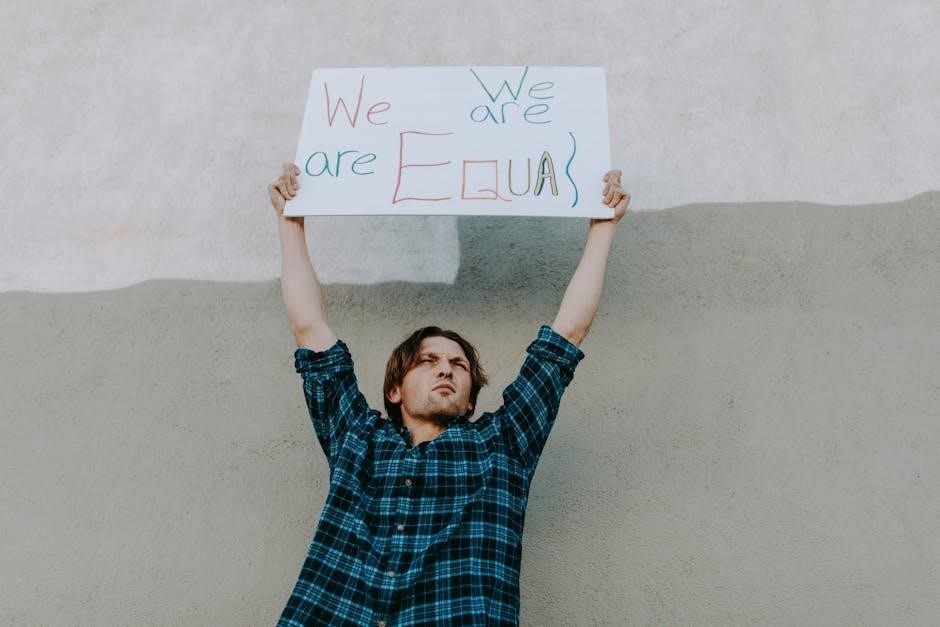Chimamanda Ngozi Adichie’s essay, adapted from her 2012 TED Talk, explores the misrepresentation of feminism and advocates for gender equality. It is available in PDF and illustrated formats, sparking global conversations about inclusivity and societal change, emphasizing why everyone should embrace feminism to foster a more equitable world.
1.1 Overview of the Essay and Its Significance
Chimamanda Ngozi Adichie’s essay, We Should All Be Feminists, is a powerful call for gender equality and a critique of societal norms. Originating from her 2012 TED Talk, it challenges stereotypes and highlights the importance of inclusive feminism. The essay addresses the misrepresentation of feminism, advocating for a world where gender does not limit opportunities. Its significance lies in its ability to spark global conversations, making it a vital read for understanding modern feminist discourse and its relevance to all genders.
1.2 The Origin of the Essay as a TED Talk
Chimamanda Ngozi Adichie’s essay originated from her 2012 TED Talk at TEDxEuston in the UK. Titled We Should All Be Feminists, the talk addressed gender inequality and societal stereotypes, emphasizing the need for inclusive feminism. Its viral reception led to widespread acclaim, prompting the adaptation of the speech into a written essay. This essay, available as we all should be feminist pdf, has become a cornerstone of modern feminist discourse, inspiring global conversations about equality and challenging patriarchal norms.

Core Arguments of the Essay
Adichie challenges gender stereotypes, advocating for equality and debunking feminism’s misrepresentation. She highlights systemic marginalization of women, emphasizing its harm to all genders, in her seminal essay, available as we all should be feminist pdf.
2.1 Misrepresentation of Feminism in Society
Adichie addresses the widespread misrepresentation of feminism, often reduced to stereotypes like “man-hating” or “anti-tradition.” She argues that these misconceptions obscure its true purpose: fighting for gender equality. In her essay, available as we all should be feminist pdf, she emphasizes how societal perceptions distort feminism’s message, deterring people from embracing it. By challenging these stereotypes, Adichie advocates for a broader understanding of feminism as a movement for human rights, benefiting all genders and cultures alike.
2.2 The Consequences of Gender Inequality
Gender inequality perpetuates harm across all genders, limiting opportunities and fostering discrimination. Adichie highlights how rigid gender roles restrict both men and women, leading to mental health issues, stifled potential, and societal stagnation. Her essay, available as we all should be feminist pdf, underscores the need to dismantle these structures. By challenging systemic inequality, individuals can break free from oppressive norms, fostering a more inclusive and progressive world for everyone. This societal shift is crucial for true equality and human flourishing.

Personal Anecdotes and Experiences
Adichie shares personal stories of her childhood in Nigeria and experiences with gender bias across cultures, shaping her feminist perspective and advocacy for equality.
3.1 Chimamanda Ngozi Adichie’s Childhood in Nigeria
Adichie recounts her upbringing in Nigeria, where societal expectations of gender roles were deeply ingrained. She reflects on how her early experiences shaped her understanding of gender inequality and influenced her advocacy for feminism. These personal insights highlight the cultural context that informed her perspective on women’s rights and societal norms.
3.2 Experiences with Gender Bias in Different Cultures
Adichie shares her encounters with gender bias across various cultures, highlighting how societal expectations vary yet perpetuate inequality. In Nigeria, rigid gender roles were ingrained, while in America, she faced subtle yet pervasive discrimination. Her experiences underscore the universal nature of gender inequality, shaped by cultural norms that restrict both men and women. These insights emphasize the need for a broader, inclusive definition of feminism that addresses the diverse ways gender norms impact individuals globally.
Cultural and Societal Perspectives
Adichie explores how cultural norms shape gender roles, emphasizing the universal impact of societal expectations. Her essay highlights the global relevance of challenging gender inequality and stereotypes.
4.1 Feminism in the Context of Nigerian Culture
Adichie examines how Nigerian culture influences gender roles, often restricting women’s opportunities. She highlights the tension between cultural traditions and feminist ideals, advocating for a redefined understanding of feminism that aligns with Nigerian values while challenging oppressive norms. Her experiences growing up in Nigeria illustrate the societal resistance to gender equality, emphasizing the need for cultural shift to embrace feminist principles and promote inclusivity in her homeland.
4.2 The Role of Patriarchy in Perpetuating Inequality
Adichie highlights how patriarchy reinforces systemic inequality, perpetuating gender-based discrimination and limiting opportunities for women. She argues that patriarchal structures normalize oppressive norms, creating power imbalances that affect both men and women. Drawing from personal experiences and cultural observations, Adichie emphasizes that patriarchy is not only a women’s issue but a societal one, requiring collective effort to dismantle. Her essay calls for a reevaluation of gender roles to achieve true equality and inclusivity, challenging stereotypes that perpetuate inequality globally.

The Impact of Feminism on All Genders
Feminism dismantles harmful stereotypes, benefiting men and women equally by promoting equality and challenging rigid gender roles, fostering a more inclusive and equitable society for all genders.
5.1 How Feminism Benefits Men and Boys
Feminism challenges rigid gender stereotypes, freeing men and boys from societal expectations that restrict emotional expression and limit their roles. By promoting equality, feminism encourages mutual respect and understanding.
It allows men to embrace vulnerability and share caregiving responsibilities, fostering healthier relationships and personal growth. Feminism’s inclusive approach liberates everyone from oppressive norms, creating a more balanced and equitable society for all genders to thrive.
5.2 The Importance of Male Allies in Feminism
Male allies play a crucial role in advancing feminism by challenging patriarchal norms and advocating for equality. Their support amplifies women’s voices and helps dismantle systemic gender biases.
By actively promoting fairness and respect, men can create safer, more inclusive environments. Feminism benefits everyone, and male allies are essential in fostering a society where all genders thrive equally. Their involvement is not just about supporting women but also about redefining masculinity and embracing a more equitable world for all.

The Global Relevance of the Message
Adichie’s TED Talk-turned-essay resonated globally, sparking discussions on gender equality and challenging stereotypes. Its universal message transcends cultures, emphasizing the importance of feminism worldwide.
6.1 The Essay’s Reception Across the World
Chimamanda Ngozi Adichie’s essay has been widely acclaimed globally, resonating with diverse audiences. Its adaptation from a TED Talk into a PDF and illustrated formats has enhanced accessibility, making it a pivotal resource in discussions about gender equality. The essay’s message of inclusivity and challenge to stereotypes has been embraced across cultures, sparking meaningful conversations and inspiring change worldwide. Its global relevance underscores the universal need for feminism as a tool for societal transformation.
6.2 The Viral Spread of the TED Talk
Chimamanda Ngozi Adichie’s TED Talk, “We Should All Be Feminists,” gained viral attention worldwide, sparking a global conversation on gender equality. Its adaptation into a widely shared PDF and illustrated transcript further amplified its reach. The talk’s compelling narrative and universal message resonated across cultures, making it a landmark moment in modern feminist discourse. Its viral spread underscored the power of digital platforms in disseminating important ideas, ensuring its impact extended far beyond the original audience.

Key Themes and Takeaways
The essay emphasizes inclusive feminism, challenging stereotypes, and promoting equality for all genders. It highlights how gender inequality affects everyone, advocating for a society where both men and women thrive without rigid roles.
7.1 The Need for Inclusive Feminism
Adichie advocates for an inclusive feminism that addresses the diverse experiences of women and men globally. She emphasizes that gender inequality affects everyone, not just women, and that a broader definition of feminism is essential. By challenging stereotypes and societal expectations, inclusive feminism fosters equality and creates opportunities for all genders to thrive. This approach ensures that no one is marginalized and that everyone benefits from a fairer society, free from rigid gender roles.
7.2 Challenging Stereotypes and Misconceptions
Adichie challenges common stereotypes that portray feminists as anti-men or overly aggressive. She argues that these misconceptions hinder progress toward equality. By sharing personal experiences, such as being labeled a “happy feminist” and facing criticism, she illustrates how societal expectations restrict both men and women. Her essay debunks myths about feminism, emphasizing its universal benefits. This approach encourages a redefinition of feminism, promoting understanding and inclusivity while addressing the global relevance of these issues.

Formats and Accessibility of the Essay
The essay is widely available in PDF, ePUB, and illustrated transcript formats, ensuring accessibility for readers worldwide, making Adichie’s powerful message easily attainable.
8.1 The Essay in PDF and ePUB Formats
We Should All Be Feminists is accessible in both PDF and ePUB formats, making it easy for readers to engage with Adichie’s insights on gender equality. These digital formats allow for convenient reading on various devices, ensuring the essay’s message reaches a broad audience. The PDF version is particularly popular, offering a clean layout that enhances readability. Additionally, platforms like Perlego provide free access to these formats, further expanding the essay’s accessibility and impact globally.
8.2 The Illustrated Transcript Edition
The illustrated transcript edition of We Should All Be Feminists offers a visually engaging experience, combining Adichie’s powerful words with artwork from diverse artists. This unique format enhances the essay’s emotional impact, making it a compelling read. The illustrations, sourced from countries like Argentina, Israel, and Nigeria, reflect the global relevance of Adichie’s message. This edition is particularly praised for its ability to captivate readers visually while reinforcing the essay’s core themes of equality and inclusivity.
Adichie’s essay concludes by urging everyone to embrace feminism for a fairer society. She calls for collective action to dismantle gender biases and promote equality globally.
9.1 The Importance of Embracing Feminism
Embracing feminism is crucial for fostering equality and dismantling systemic gender biases. It promotes inclusivity, challenging stereotypes and societal norms that restrict both men and women. By advocating for feminism, we create a more equitable world where everyone can thrive, regardless of gender. Adichie emphasizes that feminism is not just for women but benefits all genders, fostering a balanced society where opportunities are accessible to all. This inclusive approach ensures a brighter future for generations to come.
9.2 Steps Toward a More Equitable Society
Creating a more equitable society requires collective action, starting with education on gender equality and challenging harmful stereotypes. Encouraging active participation from all genders in promoting fairness is crucial. Supporting policies that foster inclusivity and reduce discrimination is another key step. Utilizing accessible resources like the PDF and illustrated versions of Adichie’s essay can help spread awareness and inspire change. By working together, we can build a society where opportunities are accessible to everyone, fostering true equality for all.

No Responses